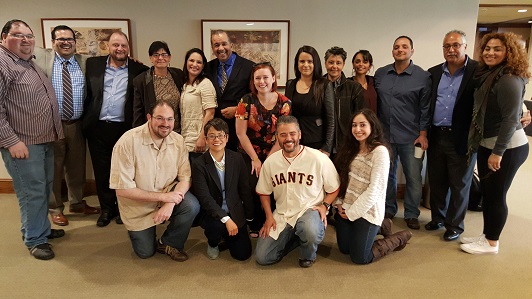Housed in the historic College of Ethnic Studies at San Francisco State University, alongside the studies of Indigenous communities and other communities of color, the Arab & Muslim Ethnicities and Diasporas Studies (AMED) program is framed within a justice centered perspective that is grounded in the need for accountability and service to multiple publics, including those within and outside of the academic community.
AMED generates and advances a counter narrative that views Arab and Muslim communities as communities of color within the US, in the Americas, and transnationally across other diasporas. AMEDs intellectual focus and framing will complement and build on the Comparative Ethnic Studies approach that is central to the Race and Resistance Studies Program in the College of Ethnic Studies.
AMED Studies provides an intellectual home to scholarship and analysis on pertinent issues affecting Arab and Muslim communities. Through engagement with the larger community, with activists and scholars engaged in critical and decolonizing work in the field, through its efforts toward documentation, analysis, and skilled pedagogy, AMED Studies represents a cutting-edge initiative and an urgent scholarly enterprise for students at SF State.

Program Scope
The Minor in Arab and Muslim Ethnicities and Diasporas Studies (AMED) is a multidisciplinary program that provides undergraduate students with a justice-centered analysis in which gender, race, ethnicity, sexuality, citizenship, age, ability, and other structural inequalities are integral to the study of Arab and Muslim communities, and addresses the context in which these groups have existed and continue to develop in the current socio-political climate. The program is designed to bring together a wide range of areas, including Arab, Middle East, and Global Studies, race and ethnic studies, and critical cultural studies. Curricular focus areas include history, identity, politics, pop culture, literature, art, creativity, activism, gender, sexuality, race, immigration and citizenship, and comparative studies with other communities. AMED provides students with a non-traditional perspective on national and transnational positioning and resistances of Arab and Muslim communities.
Program Learning Outcomes
- Learn how to apply a justice-centered analysis to the experiences of Arab and Muslim communities.
- Identify the socio-political contexts that Arab and Muslim communities have faced.
- Identify how structural inequalities, such as those of gender, race, ethnicity, sexuality, citizenship, age, and ability, impact Arab and Muslim communities.
Minor in Arab and Muslim Ethnicities and Diasporas Studies — 15 units
- Only one-third of the units, or no more than two courses, can be taken on the basis of credit/no credit.
- A minimum of 6 upper-division units are required to complete the minor.
- All coursework used to satisfy the requirements of the minor must be completed with a minimum grade point average of 2.0.
- Written declaration of the pursuit of the minor is not necessary prior to enrollment in any of its required or elective courses.
Required Core Courses (6 units)
| Code | Title | Units |
|---|---|---|
| RRS 101 | Introduction to Arab and Muslim Communities | 3 |
| RRS 255 | Voices in Exile: Arab and Muslim American and Civil Liberties post-9/11/2001 | 3 |
Electives (9 units)
Must select one course (3 units) from each section; two courses (6 units) must be upper-division of 300 or above. Up to 3 units of electives can be selected from another department upon advisement and approval of the program chair.
| Code | Title | Units |
|---|---|---|
| Section I: Arab and Muslim Histories, Identities, and Cultures (Humanities track) | ||
| RRS 201 | SFSU's Palestinian Cultural Mural and the Art of Resistance | 3 |
| RRS 240 | All Power to the People: Comparative Freedom Movements of the "Sixties" | 3 |
| RRS 420 | Arab American Identity: Memory and Resistance | 3 |
| RRS 430 | Arab Media Images in America: Impact on Arab Americans | 3 |
| RRS/ARAB 450 | Contemporary Arabic and Arab American Literature | 3 |
| Section II: Mapping Arab and Muslim Communities: Comparative Ethnicities and Diasporas (Critical Race Track) | ||
| RRS/ETHS 110 | Critical Thinking and the Ethnic Studies Experience | 3 |
| RRS 310 | Arab Revolutions and Social Movements | 3 |
| RRS 370 | Islamophobia: Roots, Development, and Contestation of Hatred | 3 |
| RRS 435 | National Security and the Racialization of Arabs and Muslims in North America | 3 |
| RRS 620 | Colonialism, Imperialism, and Resistance | 3 |
| RRS 630 | Palestine: Ethnic Studies Perspective | 3 |
| RRS 655 | Comparative Border Studies: Palestine and Mexico | 3 |
| Section III: Gender and Sexuality Studies in Global South: Arab and Muslim Communities | ||
| RRS 260 | Introduction to Arab and Arab American Feminisms | 3 |
| RRS/WGS 566 | Gender and Modernity in the Muslim and Arab Worlds | 3 |
| WGS 565 | Muslim Feminisms | 3 |